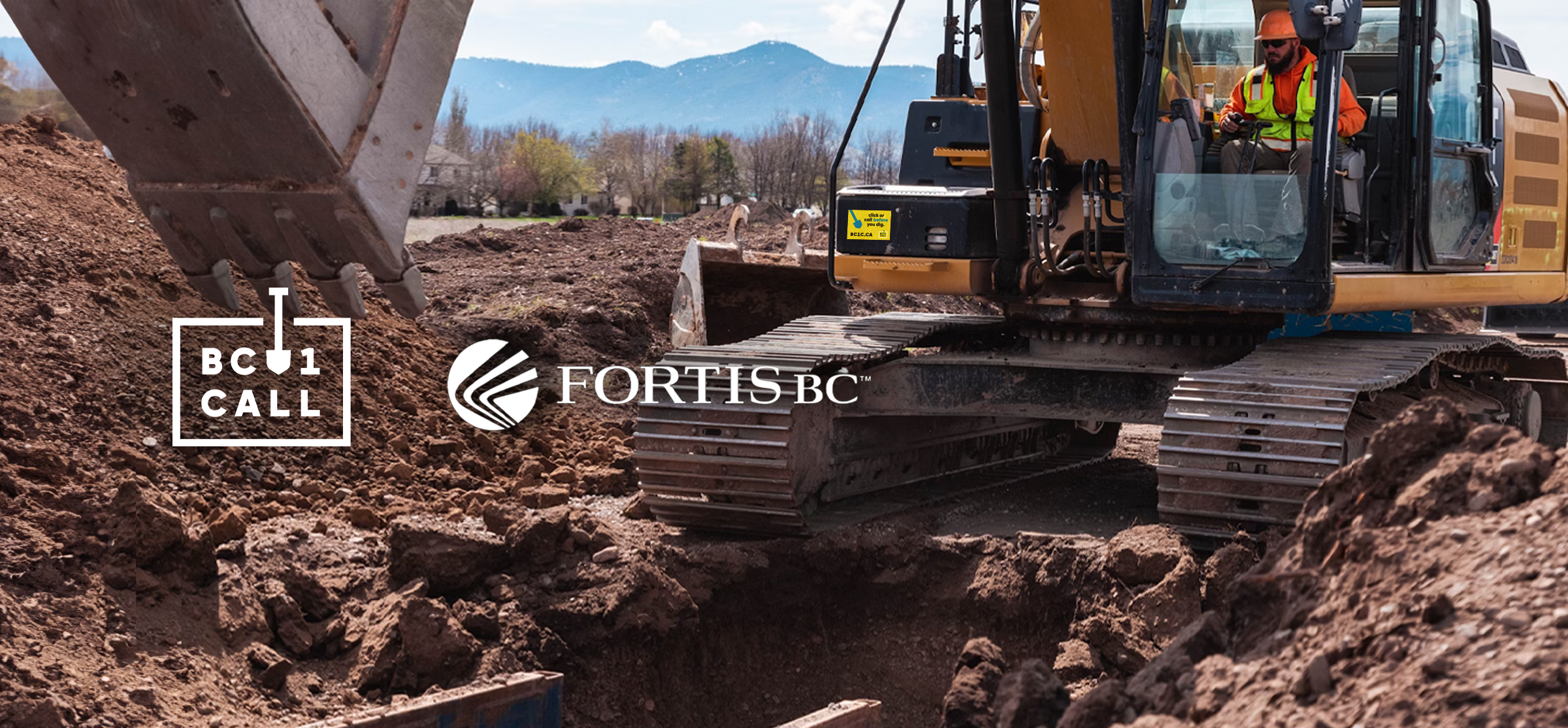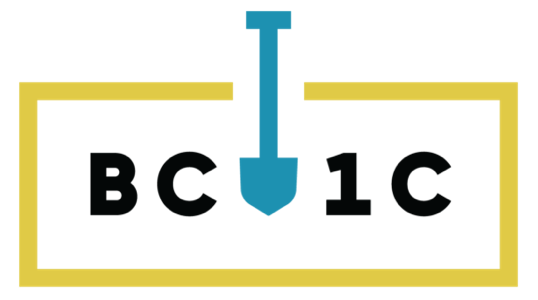
Damage incidents to FortisBC’s gas lines down in 2023 as more British Columbians clicking or calling before they dig
Nearly 70 per cent of damages to underground gas lines in 2023 belong to ground disturbers without a BC 1 Call ticket
Vancouver, B.C. April 15, 2024: With April being Safe Digging Month, FortisBC Energy Inc. (FortisBC) and BC 1 Call are teaming up to ask residents and contractors to click or call BC 1 Call before they dig, excavate or disturb the ground in any way as they begin their spring garden work. Knowing the location of underground gas lines reduces the risk of personal injury, avoids interrupting essential services and prevents costly repairs.
In 2023, FortisBC saw 844 instances of damage to underground gas lines. Nearly 70 per cent of the incidents were the result of work performed without contacting BC 1 Call prior to digging. Of the other 30 per cent, most did not appropriately use the information provided or did not dig by hand first.
Of the 2023 recorded damage incidents, the region with the highest percentage of line strikes is Metro Vancouver at 327 (38.7 per cent), followed by Thompson Okanagan at 183 (21.6 per cent) and Vancouver Island at 132 (15.6 per cent). For individual municipalities, the City of Surrey reported 64 damages (7.5 per cent) in 2023, making it the city with the highest number of incidents, followed by the City of Vancouver with 58 (6.8 per cent), Kelowna with 41 (4.8 per cent), Burnaby with 38 (4.5 per cent) and North Vancouver with 33 (3.9 per cent).
“It is very promising to see our damage incidents decreasing by about 10 per cent year over year since 2020,” said Tanya Kowalenko, program manager, public safety, FortisBC. “We commend British Columbians for all the work being done to educate and mandate safe digging practices. However, even one incident is one too many. Approximately 90 per cent of damages to our gas lines are preventable by following safe excavation practices―starting with a free call to BC 1 Call.”
BC 1 Call is a free and convenient service offered to the general public and contractors. A quick click or call to request a locate ticket is all that it takes to have BC 1 Call notify those of its 363 utility owning members whose assets lie within the dig site. This can be done by either visiting the BC 1 Call website or calling 1-800-474-6886. BC 1 Call members will get back to you within three business days with instructions on how to avoid damaging underground infrastructure. It is critical requesters follow the safe digging instructions sent to them. Armed with this information, along with other safe digging practices, individuals can collectively reduce the risk of injury, avoid the interruption of essential services and prevent costly repairs.
As warmer weather approaches, landscaping, gardening and renovation projects are soon to be in full swing, increasing the risk of more incidents of damage to underground infrastructure. Causing damage to a gas line is possible even from basic gardening activities such as planting fruit trees or perennials. That said, nearly 75 per cent of damages to gas lines across the province are caused by contractors. Those contractors who dig with equipment or machinery are required to first dig by hand in order to expose any buried utility lines.
In 2023, BC 1 Call received more than 229,000 locate ticket requests, with 83 per cent of these requests coming via its online platform. Contractors lead the pack with 66 per cent of the locate tickets placed, followed by member employees at 25 per cent and homeowners at nine per cent. BC 1 Call also saw the largest increase in registered users, at 17 per cent, which works out to 1,666 new users every month.
“Though the number of registered BC 1 Call users continues to climb each year, there are many contractors, landscapers and homeowners who still aren’t aware of safe digging practices, which is why we are continuing to see damage,” said Chris Hyland, president and CEO of BC 1 Call. “As April is Safe Digging Month in B.C., we are encouraging all British Columbians to learn how to dig safely before disturbing the ground, confirm their landscapers and outdoor DIY project contractors will be using BC 1 Call and spread the word about safe digging.”
FortisBC and BC 1 Call urge all contractors to implement safe digging practices into their routines and educate their workers on the importance and convenience of BC 1 Call’s free online platform. For more information on safe digging practices, visit fortisbc.com/digsafe. To request a locate ticket, or learn more about BC 1 Call, visit bc1c.ca.
-30-
FortisBC Energy Inc. is a regulated utility focused on providing safe and reliable energy, including natural gas, Renewable Natural Gas and propane. FortisBC Energy Inc. employs around 2,096 British Columbians and serves approximately 1,075,595 customers across British Columbia. FortisBC Energy Inc. owns and operates approximately 51,200 kilometres of gas transmission and distribution pipelines. FortisBC Energy Inc. is a subsidiary of Fortis Inc., a leader in the North American regulated electric and gas utility industry. FortisBC Energy Inc. uses the FortisBC name and logo under license from Fortis Inc. For further information on FortisBC, visit fortisbc.com. For further information on Fortis Inc., visit fortisinc.com.
BC 1 Call is the link between the excavating community and the owners of underground infrastructure. By contacting BC 1 Call, private landowners and commercial excavators reduce the risk of personal injury and property damage. BC 1 Call has over 360 members across British Columbia including municipalities, communication service providers, gas and pipeline companies and irrigation and improvement districts. BC 1 Call is governed by a volunteer Board of Directors and has support from the BC Energy Regulator (formerly the BC Oil and Gas Commission), the National Energy Board, Technical Safety BC and WorkSafe BC.
Additional quotes:
- “The Vancouver Island Construction Association (VICA) is a strong advocate for Safe Digging Month and committed to educating our members on ways to build safely and responsibly, without disrupting the communities we serve,” said Rory Kulmala, chief executive officer of VICA. “We look forward to continuing to work with VICA members and the Vancouver Island construction community to ensure they have the tools and resources available to dig safely.”
- “WorkSafeBC urges all individuals and employers engaged in excavation activities to prioritize worker safety. Contacting BC 1 Call before digging isn’t just a regulatory requirement – it’s a critical step in safeguarding lives. Hitting utility lines underground poses significant risks to workers’ well-being and threatens community infrastructure and public safety. But it is also 100 per cent preventable. Let’s make it a collective commitment to call before we dig, follow all requirements, and ensure a safer environment for all.” – Suzana Prpic, senior manager, Prevention Field Services, WorkSafeBC.
- Southern Interior Construction Association (SICA), Clifford Kshyk, CEO – “As stewards of safety in the Industrial Construction sector, we stand united with BC 1 Call. Every dig, big or small, has the potential to carry risks. Before breaking ground, click or call to prevent accidents. Prioritize safety for yourself, your colleagues, and your assets.”
- “The Northern Regional Construction Association (NRCA) is a dedicated advocate and educator of safety best practices year round. Supporting the promotion of Safe Digging Month and use of BC 1 Call in our region is a natural extension of NRCA’s values and priorities.” said Nicole Bryant, Chief Executive Officer
MEDIA CONTACTS:
Holly Harrison
Corporate communications specialist
FortisBC
Phone: 604-209-8031
Email: holly.harrison@fortisbc.com
fortisbc.com
@fortisbc
24-hour media line: 1-855-FBC-NEWS or 1-855-322-6397
Amanda Munro
BC 1 Call
Phone: 604-360-3994
Email: communications@bc1c.ca
Backgrounder
About BC 1 Call
- A locate request to BC 1 Call must be submitted a minimum of three business days before the work begins, to allow members enough time to provide the necessary information to homeowners and contractors.
- Both BC 1 Call’s service and the information sent by members are 100 per cent free of charge.
- When someone requests a locate ticket by clicking or calling BC 1 Call, it triggers a notification to the utility owners to share drawings and information on what’s below the surface in the described dig area, and how to safely avoid hitting infrastructure.
- Excavators are not clear to dig until all utilities they are told to expect to hear from have responded.
Gas safety
- If you smell rotten eggs or hear the sound of escaping gas, stop what you’re doing, go outside and dial 9-1-1 or call FortisBC’s 24-hour emergency line at 1-800-663-9911.
- Gas is a safe and reliable energy. It’s lighter than air when outdoors, so when it vents or leaks outside from a line it rises and dissipates quickly.
- Gas is naturally odourless, so FortisBC adds trace amounts of a pungent odourant called mercaptan that makes gas smell like rotten eggs so British Columbians can easily detect it.
- For more information on gas safety, visit fortisbc.com/safety.
Underground infrastructure and damage incidents
- According to the 2022 Damage Information Reporting Tool (DIRT) Report, excavation/construction stakeholders were the leading source of damage reports for the first time in 2022.
- Contractors were involved in more than half of damages while completing telecommunications and gas work resulting in these underground utilities being the most frequently damaged in 2022 (page 7).
- Common home improvement projects that may cause damage to underground infrastructure include:
- installing posts for fences, mailboxes, realtor signs, welcome signs, etc.
- building decks, retaining walls and patios and installing fire pits
- tree planting and digging a garden
- anchoring playground equipment
- installing in-driveway heating systems
- installing water systems and sewer systems
- Underground infrastructure includes: pipes and cables used to transport oil and gas (natural gas or propane), water and sewage, electricity and telecommunication services across B.C. All are integral to daily living.
- Some underground infrastructure may be less than a foot below the surface, depending on ground leveling work and erosion since installation.
To view this release in simplified Chinese, download below. Simplified Chinese
To view this release in Punjabi, download below. Punjabi
